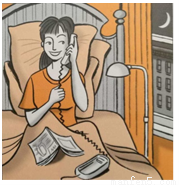
When the telephone rings late at night, most women guess it must be one of only four or five people calling. A sister?Maybe.An emergency?Possibly.A mother?Probably not at that time of night. Much more probably it is a close female friend calling to tell you that she has split up with her boyfriend again or perhaps simply that a good movie has just started on TV.
At a time when families are spread far and wide and marriages often end in divorce, friendships are becoming more and more important. Erika, a 32-year-old lawyer, is strengthened by her ten-year friendship with her married friend Jane. “I was very sick one night, so I called Jane at about 3:00 a.m. to talk about it,” she says. “She was very supportive and even came over to take me to the doctor’s the next morning.”
As American TV shows like Friends, which follows the lives of a very close group of young friends, have become more popular, many of us are beginning to see the value of such friendships. TV shows like this tell us that our romantic relationships may not last, but we need to keep in touch with our close friends if we want to survive.
A TV show called Real Women is about the lives and relationships of five former school friends. In this show, family, husbands, and work are all less important than friendships. One of its actresses says the show reflects her own experience. “Friendship is about commitment. I don’t see some of my friends for ages but when we get together, it is as if time hasn’t passed.”
This is true of Erika and Jane’s friendship. With Erika’s family 200 miles away, it is Jane who keeps a spare set of keys to Erika’s apartment and waters her plants whenever she is away. “Having Jane around gives me a certain amount of freedom. It is not the kind of thing that you could ask anyone to do, but she knows I would do the same for her.” Erika feels that because she no longer sees her family every day, she now enjoys a closer relationship with her best friend. Jane, who may move to a different city soon, is worried about leaving such a support system of friends. “My friends have more to do with my life than my parents and, therefore, I don’t have to spend a lot of time explaining things to them. Friends are more up to date with what is happening.”
1.According to the passage, a late-night phone call for most women is probably from ________.
A. a friendB. a relativeC. a strangerD. a doctor
2.TV shows like Friends tell us that ________.
A. marriages with friends often end up in failure
B. families and work are as important as friends
C. close friends help us face problems in life
D. friendship fades as time goes by
3.From the passage, we can learn that Erika and Jane ________.
A. live far away from each other
B. have been friends for 32 years
C. spend a lot of time explaining things
D. trust and support each other in daily life
4.Which of the statements will the author probably agree with?
A. A near friend is more helpful than a faraway relative.
B. Both marriage and friendship demand commitment.
C. However far away we’re, parents worry about us.
D. Long distance makes the hearts closer.